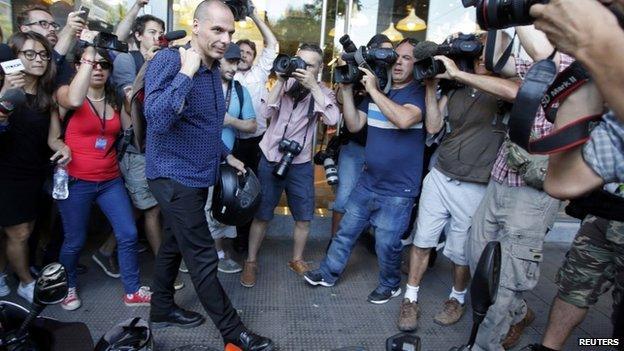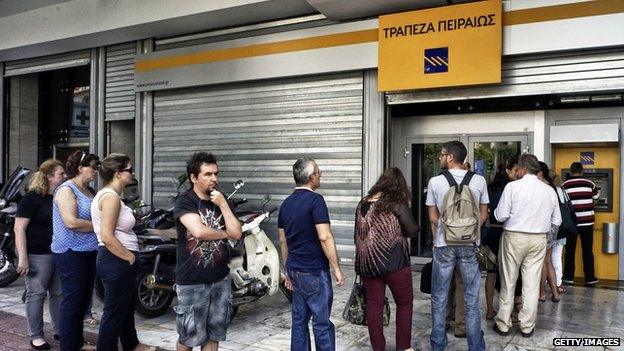Was the Greek finance minister pretending to be mad?
- Published
- comments

Yanis Varoufakis on his motorcycle
Was the Greek negotiating strategy with the Eurogroup designed to convince the rest of Europe that the Syriza government was mad?
That is a notion raised by Daniel Finkelstein in The Times today. This idea - which has fans in Westminster and Whitehall - strikes me as a misreading of the situation in Europe.
This idea has arisen because Yanis Varoufakis, the former Greek finance minister, is a game theorist, a type of economist who studies interactions in simplified versions of reality.
These stylised scenarios are known, in the jargon, as "games", external. Famous ones you might have heard of include "the Stag Hunt", "The Ultimatum Game" and - most famously - "the Prisoner's Dilemma".
One famous game is called "Chicken". Imagine two cars racing towards one another. If neither swerves, both drivers lose. If either swerves, however, that person is deemed to lose.
This is a bit like the Greek negotiation. Neither side wants to give in first, but neither side wants to end with no deal.
This is a hard game to be good at - unless you can send a worrying signal to the driver of the other car.
You could try to convince the other driver that you have no control of the car, so they will be forced to move.
Inside options and outside options
Rip off the steering wheel and wave it out of the window, perhaps? Or you could behave like you enjoy crashes - or are indifferent to the pain they cause. That, Lord Finkelstein has suggested, was part of the Greek negotiating strategy.
Lord Finkelstein wrote, external: "Varoufakis believed that if his negotiating partners - the Germans, the IMF, the Commission - concluded he was a bit bonkers, a bit reckless, they would appreciate that he might crash the Greek economy and bring down the whole edifice of the euro on top of him. Persuading your adversary that you are mad is a classic game theory gambit."
I think you can understand the Greek position much more simply: they predicated their negotiating position on notions that turned out to be untrue.
Here is another simple idea from game theory: a classic negotiation between two parties is best understood by looking at ideas called the "outside option" and the "inside option".
The outside option is the outcome for each individual if the negotiation fails. The inside option is what you get if the negotiation is completed. Negotiation is usually the process of changing the value of the inside option.

What would Frank Butcher- a used car salesman in soap opera EastEnders - have made of Greece's negotiating position?
If you are trying to buy a car from a salesperson, then the outside option is walking away - keep your cash, take no car and retain the option of starting a negotiation with other salespeople.
For the seller, the outside option means keeping the car, having less cash and retaining the option of selling that car to someone else.
Fair and free negotiations will usually fail unless the inside option is better than the outside option.
Greek assumptions
If it is better not to agree for any party, they won't. My assumption (largely based on Duncan's great reporting, external) is that Mr Varoufakis, a few months ago, thought that the outside option for Europe was gruesome.
So he could demand a lot, and they would still agree because it would be better for them.
For example, we know that he estimated that a messy Greek default would lead to financial contagion: for the sake of not saving little Greece, Europe could make investors worry about lending to Portugal, Spain or Italy.
He wrote in 2012 "the notion that Europe is ready for a Grexit is absurd."
Measures then under way by the ECB could not limit "the damage on Spain, then Italy etc."

Yanis Varoufakis surrounded by media
In short, if Europe did not cut a deal, Greece would rip Europe in two. That would make the outside option for Europe a catastrophe.
And Mr Varoufakis also assumed that the outside option for Greece was not all that bad. That means his hand, in a negotiation, would be very strong.
That is because, quite recently, Greece was running a so-called "primary surplus" earlier this year.
That means if it got cut off from financial markets because it failed to pay its debtors, it could still keep its public services running.
I would presume he also thought the banks would be kept afloat by the European Central Bank: in previous chapters of the crisis, it actually rewrote its own rules to keep the banks open and liquid in Greece.
In that situation, Mr Varoufakis thought the damage of a failure to agree would be much worse to Europe than it would be to Greece.
And, in that situation, the best strategy for Greece is to wait. This isn't a "madman" strategy. It's a quite rational calculation about the outside option.
So he wanted to wait for investors to start fretting and fussing, for bond yields to rise, for bank shares to start shedding value and for a credit squeeze to start moving through Europe.
If contagion ever made it look like Spain or - heaven forbid - the vast Italian debt could not be serviced, the Eurogroup would race to offer a deal to Greece on good terms.
There was a catch, though. All of his assumptions were wrong.
What went wrong?
First, investors have been very unconcerned by Greek default. They see the politics and arithmetic of Greece as different to the rest of the continent and do not see parallels between them.
So the market panics never came. The Eurogroup could afford to wait.
Second, Greece nosedived into recession. It is surely not now running a primary surplus.
That means that Greece needs help just to run the existing level of public services. That means pain to Greece for not being able to access new financing. It cannot wait.
Third, the ECB did not keep Greece's banks going, which means the economy is being suffocated.
Every day that this runs on makes the situation worse, businesses being shut down and individuals suffering. This whole scenario is dismal for the Greeks - and worsens every day.
In short, the outside option turns out, in the past few weeks, to have been much worse for Greece and a lot less damaging to the rest of Europe than they thought.

People wait in line to withdraw money from an ATM in Greece
So the inside option they thought they might be able to extract from the rest of Europe turns out to be much worse than they once imagined.
That all strikes me as a simpler explanation of the Syriza strategy than a "madman at the wheel" gambit.
Indeed, put this argument another way: if you were to pursue that strategy, would you do it like this?
If I were pursuing that approach, I would start openly preparing for a messy default and exit from the Eurozone.
This is not to say that I think Syriza solely misjudged the economics.
Natural allies in Rome and Paris were alienated. Syriza misunderstood what role the US State Department would play.
They made it politically difficult for German and Dutch politicians to help them.
They also behaved, at times, as though the governments who lend them money do not have their own democratic mandates.
But I think a misreading the outside option for the rest of Europe is a major part of what went wrong - not a failed plea of insanity.